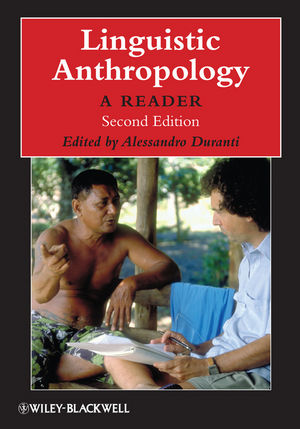Linguistic Anthropology: A Reader, 2nd EditionISBN: 978-1-4051-2633-5
Hardcover
536 pages
May 2009, Wiley-Blackwell
 This is a Print-on-Demand title. It will be printed specifically to fill your order. Please allow an additional 15-20 days delivery time. The book is not returnable.
Other Available Formats: Paperback
|
||||||
Preface to the Second Edition.
Linguistic Anthropology: History, Ideas, and Issues (Alessandro Duranti).
Part I: Ideal and Real Speech Communities.
Introduction.
1 The Speech Community (John J. Gumperz).
2 The African-American Speech Community: Reality and Sociolinguists (Marcyliena Morgan).
3 The Social Circulation of Media Discourse and the Mediation of Communities (Debra Spitulnik).
4 Communication of Respect in Interethnic Service Encounters (Benjamin Bailey).
5 The Idealised Native Speaker, Reified Ethnicities, and Classroom Realities (Constant Leung, Roxy Harris, and Ben Rampton).
Part II: The Performance of Language: Events, Genres, and Narratives.
Introduction.
6 Ways of Speaking (Dell Hymes).
7 Formality and Informality in Communicative Events (Judith T. Irvine)
8 Universal and Culture-Specific Properties of Greetings (Alessandro Duranti).
9 Genre, Intertextuality, and Social Power (Charles L. Briggs and Richard Bauman).
10 Narrating the Political Self in a Campaign for US Congress (Alessandro Duranti).
11 Hip Hop Nation Language (H. Samy Alim).
Part III: Language Socialization and Literacy Practices.
Introduction.
12 Language Acquisition and Socialization: Three Developmental Stories and Their Implications (Elinor Ochs and Bambi B. Schieffelin).
13 Participant Structures and Communicative Competence: Warm Springs Children in Community and Classroom (Susan U. Philips).
14 What No Bedtime Story Means: Narrative Skills at Home and School (Shirley Brice Heath).
15 Creating Social Identities through Doctrina Narratives (Patricia Baquedano-López).
Part IV: The Power of Language.
Introduction.
16 Arizona Tewa Kiva Speech as a Manifestation of a Dominant Language Ideology (Paul V. Kroskrity).
17 Language Ideology and Linguistic Differentiation (Judith T. Irvine and Susan Gal).
18 The “Father Knows Best” Dynamic in Dinnertime Narratives (Elinor Ochs and Carolyn Taylor).
19 Professional Vision (Charles Goodwin).
20 Language, Race, and White Public Space (Jane H. Hill).
21 No (Don Kulick).
Index.



